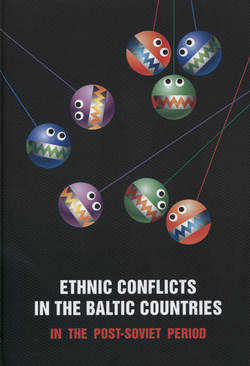Читать книгу Ethnic Conflicts in the Baltic States in Post-soviet Period - Сборник статей - Страница 10
На сайте Литреса книга снята с продажи.
Ethno-political conflicts and national identity in Latvia
Dr. pol. Mihail Rodin
Institute of European Studies, Latvia
National identity as a conflict-generating resource in Latvia
ОглавлениеAt the first approach to the phenomenon of ethnic and cultural identity in Latvia, there is confusion about the need for any new empirical data, the detection and assessment of what is happening. At the same time, the need for constant monitoring of the Latvian ethno-political relations and dynamics of growing ethno-conflicts in intensive European territorial mobility and the crisis of European multiculturalism is clearly relevant and needs.
“Sleeping” conflicts and ethnic “frozen” ethnic relations, with their inherent oppositional oral historical memory in Soviet Latvia, transformed into an open confrontation in the post-Soviet period. At present Latvia steadily formed the dominant ethno-cultural identity of the titular nationality and ethnic minorities. Intense and painful period of searching and finding new regime identities to the mid-90s is over, but the political formula of Latvian statehood has become – “ethno-cultural and ethnic plurality in a single whole.” However, these multicultural and ethnic communities, and the practice of their relationship did not turn the liberalization of ethnic relations. None of the existing democratic institutions of the Republic of Latvia and could not lead to any noticeable leveling socially significant cultural differences and ethnic boundaries, as well as connecting the rich experience of the relationships of previous generations.
Russian ethno-cultural continuity and other Latvian ethnic minorities, which proceeded the period of Awakening, uniquely treated as junk, pro-Soviet and causing various forms of ostracism. The image of “matryoshka, dried fish and vodka” studiously “affixed” for ethno-cultural component of the ethnic Russian, the most quantitatively represented in the Latvian society. Despite the proclaimed democratic principles and the public rhetoric of ethno-cultural tolerance and integration of the power elite, ethnic minorities have been effectively “deduced” from the role of policy-making positions. Tracking content and the regulatory changes in the Latvian ethnic policies, one can argue about their introduction and implementation as a result of the expectations and influences (and sometimes sanctions) external structures and political actors, in particular the European Union and Russia. Counteraction to the recommendations of the OSCE and other international human rights organizations about protecting and expanding individual rights and freedoms of ethnic minorities are systematically ran into pathos of their unfitness due to the existence of “national specific”.
According to the Canadian political scientist W. Kymlicka, the problem of ethnic discriminated groups against is the requirement is larger than the individual rights and freedoms. Ethno-cultural minorities in modern communities not only want civil rights, but also of the special rights that would allow them to recognize specific ethno-cultural practices and identity (Kymlicka, 2004). Ignoring the rights of ethnic minorities, discriminatory policies against their claims, as well as the idea of the identity of minorities as a zone of cultural anomalies becomes a hot issue and a catalyst for the revision of democratic norms and values.
In the case of the Baltic countries, the existence of the Baltic Russians and other ethnic groups, and established their particular ethno-cultural identities are sufficient reason for a recognition of their special rights, as well as a natural condition for the democratic development of these political regimes.
A major finding of our study is that ethnic majority and subordinated ethnic minorities in Latvia identify themselves with the identities of “different worlds” that the resulting in the ethno-political and cultural conflict. On the basis of factor analysis have been identified the existence of a sustainable and high correlations between the variables of ethnicity, language, culture and national symbols. High ethno-cultural self-identity of national and ethnic groups in Latvia is also characterized by stable ethnic relations and group cohesion. Survey data generally show a decline of ethnic bias and prejudice, hostile attitudes towards ethnic minorities. Respondents’ perceptions about the disappearance of the Latvian nation, culture and language, as well as national revenge as commonplaces of stereotypes are not statistically significant, and contrary to the assertions of the power elite.
Despite the presence of positive conditions for national consolidation, the Latvian state is not interested and does not have effective tools for solving ethnic and cultural conflicts and develop their political, ethnic and cultural identity.
